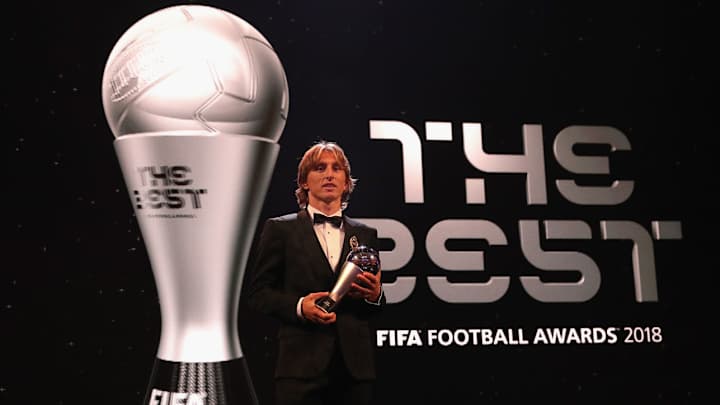Modric a Worthy Winner, But Determining 'The Best' Largely an Exercise in Marketing

The ceremony was glitzy, the evening futile and at the end of it, an era had passed. Luka Modric was named 'The Best' men's player in the world by FIFA on Monday, and after a year in which he both won the Champions League and dragged Croatia to a World Cup final this year, there can be no real arguing against that. Other than the argument that he already had the reward of winning the Champions League and playing in a World Cup final, which you would hope mean more than wearing a tuxedo that looked about three sized too large for him while listening to Idris Elba poorly attempt to translate Portuguese.
In a sense, the era had already come to an end with the omission of Lionel Messi from the three-man shortlist. After 10 years of the Ballon d’Or being shared between Messi and Ronaldo, this was an end to their hegemony. The fact that neither Messi nor Ronaldo were there itself raised questions–questions that have no answers.
Lionel Messi's FIFA 'Best' Finalist Snub Doesn't Reflect the Year He Had
Nobody knows what The Best–the new award FIFA introduced two years ago after ending the six-year merger of its own World Player of the Year Award with the Ballon d’Or, which is now run solely by France Football–is for. Nowhere are the criteria explained. “The idea,” FIFA said when it was launched in 2016, “was to connect directly with the football world. To speak the language informally used by those who love the game–and who consider a player, a coach or a goal to be simply ‘the best.’ The Best FIFA Football Awards™ were born under this sign. It is a celebration made for and by the most important actors of the football scene–the players, coaches and fans. They are the ones making the decisions.”
It is, in other words, meaningless marketing babble. The Ballon d’Or and the World Player of the Year Awards at least had a specific brief to recognize the player who had performed best in that calendar year–with a little moral gloss in the case of the France Football version. If the question, though, is who is the best player in the world right now and your shortlist doesn’t include Messi, then your understanding of football is very strange. Although perhaps not quite as strange as a voting structure that places Mohamed Salah on the three-man shortlist for "The Best" but finds no room for him on the world team of the year.
Messi, by his lofty standards, has not had a great year, despite helping Barcelona to yet another Spanish league title, and if the question is who had the best 2018, then Barcelona’s exit from the Champions League in the quarterfinal and Argentina’s last-16 exit in the World Cup understandably count against him. But that is not the question FIFA set. There is no rigor to this, no attempt to tease out what makes a player great. It’s a staged glamour for the sake of it and all the commercial benefits that brings.
Fans, frankly, are pretty much the worst people to judge such things. As Salah’s victory in the Puskas Award for best goal demonstrated, fans will vote on partisan lines, and so a public vote, far from being some great exercise in democracy, is an exercise in which club has the most online fans. Not that journalists, managers and players–who vote on the player and coach awards–are exempt from allegations of partisanship, as certain of other votes make clear.
In fact, everybody is terrible at these things, because these things are terrible–and individual awards make no sense in a team sport.
But the shortlist does raise the issue of what comes next. Ronaldo is 33, and for a couple of seasons already his contribution to games has been very little beyond scoring goals in big games. Messi is 31. Both are supremely fit and neither will yet be considering immediate retirement, but their powers are waning. Ronaldo’s move to Juventus has already taken some of the edge off the rivalry. They may meet in the Champions League later this season, but there is not the guarantee of two direct clashes each season that having them both at La Liga club brought.
France Football Launches New Women's Ballon D'Or Award
Modric, also, is 33. This is not the start of a new period of dominance from him. Rather there is a sense of football drifting back towards what used to be normality. Whatever your feelings on individual awards, the past decade has been very unusual. Never before have two players who have a solid claim to be considered among the top 10 players ever to have played the game been at or near their peaks at the same time while playing for major rivals in the same league. Messi vs. Ronaldo became about far more than the two players. It became about two interpretations of what football is, and more damagingly about Barcelona against Madrid, with all the toxicity that rivalry can bring in its wake.
Perhaps, with resources increasingly concentrated at a handful of clubs, such rivalries will become more common, but even then for two players of such stature to come along at once is very unusual.
And if football is retreating into a more normal age, in which the narratives are less driven by two key personalities, then at the very least marketing departments are going to have to work a little bit harder.

An accomplished author of multiple books, Jonathan Wilson is one of the world’s preeminent minds on soccer tactics and history.